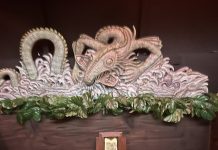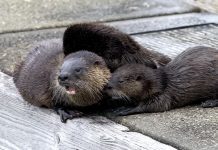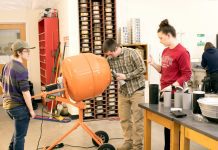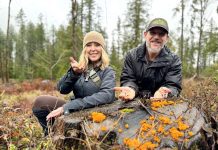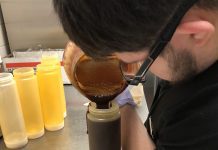Submitted by Point Defiance Zoo and Aquarium
From the jungles on the Indonesian island of Sumatra, to the cold waters of Bristol Bay Alaska, to the sea ice of Hudson Bay, Canada, and to a collaboration of zoos from Thailand to Washington, D.C., money donated in Tacoma will promote animal welfare, aid conservation efforts and advance scientific study this year.
Point Defiance Zoo and Aquarium just awarded grants totaling $131,360 to 21 projects for 2016. The money is allocated from the Dr. Holly Reed Wildlife Conservation Fund, which is administered by The Zoo Society. The grants bring the total awarded through the program to more than $1.4 million since 2002.
The Zoo Society works with Point Defiance Zoo and Aquarium to conserve wildlife and wild places at home and abroad. Donations from zoo visitors, community members and other sources provide money for the conservation fund, which is named in honor of longtime Point Defiance Zoo head veterinarian Dr. Holly Reed, who died in 2012.
Tracking Polar Bears in Canada
As climate change intensifies, polar bears are increasingly threatened. These massive mammals depend on sea ice platforms for catching their main prey, seals. Throughout much of their range, polar bears live on sea ice year-round. But in Hudson Bay, the sea ice melts entirely during the summer. The bears are forced ashore for extended periods and deprived of food for up to five months. Earlier ice melts in the summer and later freezes in the fall are prolonging their time on the mainland. Respected polar bear researchers Dr. Andrew Deroche and Geoff York intend to fit five males with GPS ear tags to monitor their distribution, movement, and habitat selection in Western Hudson Bay during the sea-ice breakup period. The data collected will help scientists make decisions for the long-term conservation of the species at a time of increasing environmental challenges. The two researchers long have worked with Polar Bears International (PBI). Point Defiance Zoo and Aquarium is an Arctic Ambassador Center and works closely with PBI to tell the story of polar bears and the challenges they face due to climate change and other threats. Here’s the link to a PBI site showing the movements of a number of female polar bears whose movements are regularly tracked. www.polarbearsinternational.org/about-polar-bears/tracking/bear-tracker
Sumatran Tiger Conservation
Poachers are hunted and brought to justice. Tigers caught in snares are rescued and released. Wildlife Response Units work with villages to address human-tiger conflict and prevent illegal habitat loss. Only a few hundred Sumatran tigers remain in the wild on their native Indonesian island of Sumatra. Grants from the Dr. Holly Reed fund help the Association of Zoos and Aquariums’ Tiger Conservation Campaign’s support this critical conservation work. The Tiger Conservation Campaign aids several on-the-ground programs through the Wildlife Conservation Society, which supports Sumatran Wildlife Crime Units and Wildlife Response Units. In the last year, efforts from these ongoing programs led to the arrest of eight poachers and the removal of 197 snares.
Working on Behalf of Endangered Clouded Leopards
They are shy. They are elusive. They are so difficult to spot in their rapidly dwindling natural habitat that no one knows for sure how many endangered clouded leopards remain in the wild. But it is universally acknowledged that the species is in trouble. Point Defiance Zoo and Aquarium works with partners across the nation to collaborate with zoological officials in Thailand on a clouded leopard breeding and research program that is crucial to continued research and understanding of these exotic, arboreal cats. The Clouded Leopard Consortium, established to improve and maintain husbandry practices, has produced successful results: more than 50 cubs have been born in the last few years at breeding and research program in Thailand. The work being done overseas also is critical to the success of the Association of Zoos and Aquariums’ Species Survival Plan® managed breeding program at home. The Clouded Leopard Consortium was just one of three programs involving clouded leopard breeding or research to receive grant money from the Dr. Holly Reed Fund this year. The zoo also supports field studies across Southeast Asia to better understand where clouded leopards range and how deforestation and oil palm plantations can affect them.
Elephant Conservation in Sumatra
Rapid conversion of Sumatran elephant habitat for development has led to increased contact between people and wild elephants. A Dr. Holly Reed Fund grant supports work being done by Conservation Response Units in the Way Kambas National Park, Lampung Province, Southern Sumatra, to address these conflicts. Formerly neglected elephants are trained to carry forest rangers into elephant territory to fight crime, rescue wildlife, reduce elephant-human conflict by herding wild elephants away from settlements and provide education and outreach programs to villages in and around the parks.
Protecting walrus habitat in Alaska
The Walrus Islands State Game Sanctuary in Bristol Bay, Alaska, protects one of the largest terrestrial Pacific walrus haul out sites in North America. Round Island, best known of seven sanctuary islands, gives walruses a large area of rocky beaches on which to rest every summer. Up to 14,000 walrus have been counted there in a single day. Stellar sea lions, other marine mammals and several species of seabirds also use the peaceful habitat. The grant from the Dr. Holly Reed Fund continues Point Defiance Zoo and Aquarium’s longstanding support of this sanctuary, which was established in 1960 and is managed by the Alaska Department of Fish and Game. It is the only wildlife sanctuary of its kind in North America.
Saving the Red Wolf through Reproductive Science
Point Defiance Zoo and Aquarium is known worldwide as the zoo that brought the red wolf back from the brink of extinction. But the species, native to the Southeastern United States, remains critically endangered. A grant from the Dr. Holly Reed Fund will aid researcher Dr. Ashley Franklin in work to increase a genetically diverse stock of frozen semen that can be used to help manage the species’ small population and safeguard against loss due to natural disasters or disease. The project includes expanding semen collection, evaluation, processing, and cryopreservation to ensure greater genetic diversity among zoo-based populations of red wolves. Artificial insemination programs help researchers study the viability of the frozen semen.
“We’re pleased that money raised in Tacoma can have such a tremendous impact on the conservation of varied species around the world,” said Point Defiance Zoo and Aquarium General Curator Dr. Karen Goodrowe Beck, who holds a Ph.D. in reproductive biology. “We know that even small grants can yield big rewards, particularly when we strategically create long-term partnerships with other zoos and wildlife organizations at home and abroad.”
For more information, go to www.pdza.org/conservation-research, www.pdza.org/save-red-wolves and www.pdza.org/save-tigers.





